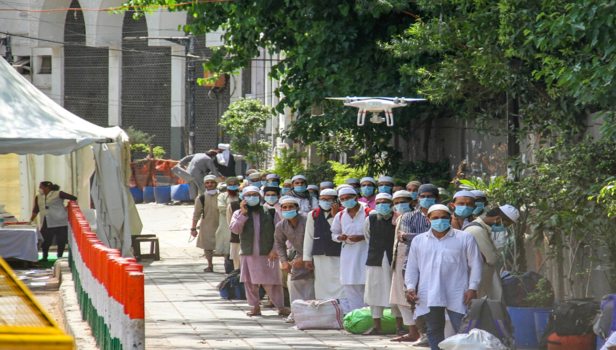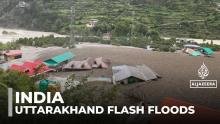Bombay High Court: Foreigners of Tabligi Jamaat were made scapegoats
22 Aug 2020 ( IBTN News Bureau )
The Bombay High Court has given an important decision in the much-talked-about Tablighi Jamaat case on Friday. The court has quashed the FIR filed against 29 foreign nationals participating in the program of Tablighi Jamaat in Markaz of Nizamuddin, Delhi.
The court said in its order that "a big propaganda was carried out in the media about the foreigners involved in Markaz and such a picture was made that these people are responsible for spreading the virus of Covid-19 disease".
These foreign nationals were accused of being involved in the Tablighi Jamaat program in violation of the terms of the Tourist Visa, due to which they were booked under various sections of IPC, Epidemic Diseases Act, Maharashtra Police Act, Disaster Management Act and Foreigners Act was recorded.
Apart from foreign nationals, the police had also registered a case against the six Indian nationals and the trustees of the mosques harboring the petitioners.
A division bench of justices TV Nalwade and Justice MG Sevalikar of Aurangabad bench heard three separate petitions filed on behalf of the petitioners. These petitioners are citizens of Ivory Coast, Ghana, Tanzania, Djibouti, Benin and Indonesia.
In fact, the police claimed that they had received secret information that these people were staying in mosques of different areas and offering prayers in violation of the lockdown rules, after which a case was registered against all the petitioners.
However, the petitioners say that they came to India with valid visa, which was issued by the Indian government and they came here to experience the culture, tradition, hospitality and Indian cuisine of India.
He says that he was screened on arrival at the airport and tested for Covid-19 virus and was allowed to exit the airport only after the report came back negative.
According to him, he even informed the District Superintendent of Police to reach Ahmednagar district. But on March 23, due to the lockdown, the vehicles were stopped, hotels and lodges were closed, due to which the mosques sheltered them. The petitioners claim that they have not done any illegal act like violating the orders of the District Collector.
According to the court's order, "a large propaganda was launched in print and electronic media on foreigners involved in Markaz and such a picture was made that these people are responsible for spreading the virus of Covid-19 disease in the country." In a way, these foreigners were persecuted."
"On the one hand, when the Corona epidemic or disaster was spreading, a politically motivated government was looking for a scapegoat, and it seems that these foreigners were made the scapegoats." All the circumstances and the latest figures related to the corona infection suggest that such steps were not required to be taken against the petitioners.''
"The time has come to repent now for taking action against foreigners in this matter and positive steps should be taken to rectify the damage that has been done."
(Click here for Android APP of IBTN. You can follow us on facebook and Twitter)
Share This News
About sharing
-
 15 Nov 2025
Why did the Grand Alliance suffer a crushing defeat in the 2025 Bihar Assembly elections?: Analysis
15 Nov 2025
Why did the Grand Alliance suffer a crushing defeat in the 2025 Bihar Assembly elections?: Analysis
Why did the Grand Alliance suffer a crushing defeat in the 2025 Bihar Assembly elec...
-
 12 Nov 2025
LIVE: India, Pakistan launch probes after blasts in New Delhi, Islamabad
12 Nov 2025
LIVE: India, Pakistan launch probes after blasts in New Delhi, Islamabad
LIVE: India, Pakistan launch probes after blasts in New Delhi, Islamabad
-
 11 Nov 2025
Delhi Red Fort blast live: Terrorism law invoked in India after 13 killed
11 Nov 2025
Delhi Red Fort blast live: Terrorism law invoked in India after 13 killed
Delhi Red Fort blast live: Terrorism law invoked in India after 13 killed<...
-
 05 Aug 2025
At least four dead, dozens missing as flash floods hit north India village
05 Aug 2025
At least four dead, dozens missing as flash floods hit north India village
At least four dead, dozens missing as flash floods hit north India village
-
 12 Jun 2025
Air India flight crashes in Ahmedabad with more than 240 people on board
12 Jun 2025
Air India flight crashes in Ahmedabad with more than 240 people on board
Air India flight crashes in Ahmedabad with more than 240 people on board



